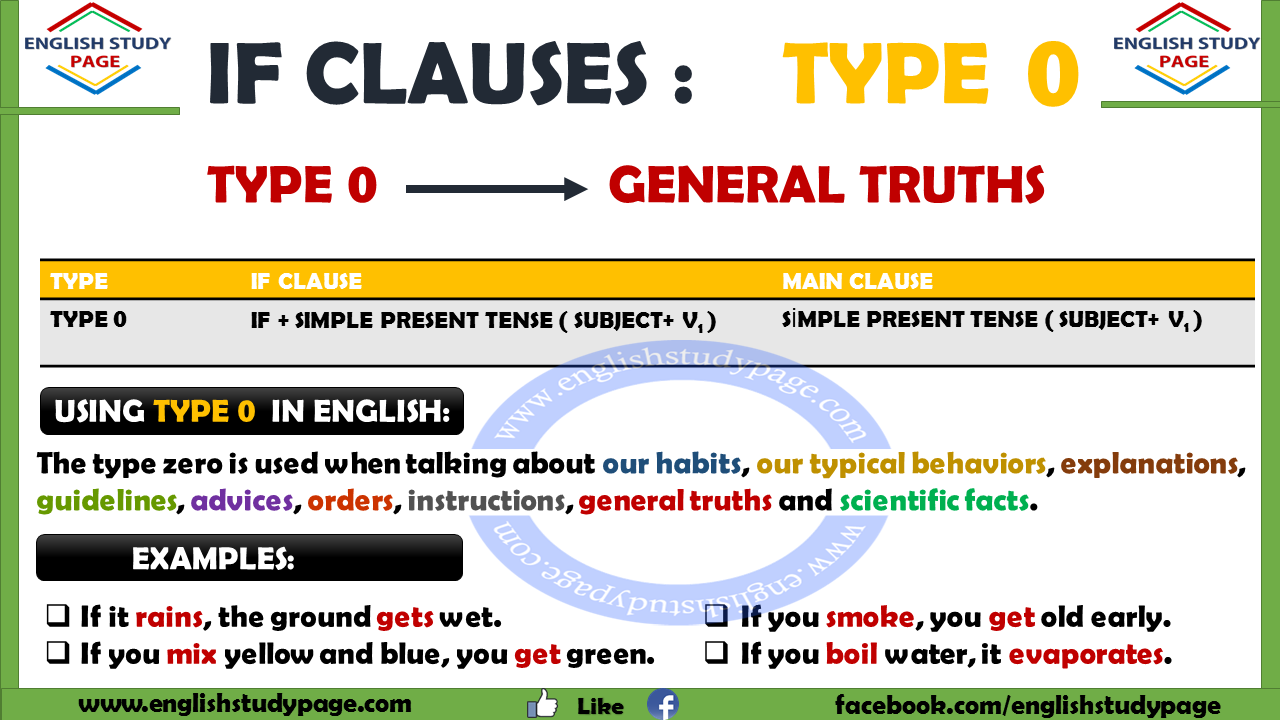
IF CLAUSES / CONDITIONAL CLAUSES (Type 0)
Sometimes the expected actions depends on a condition ( like if you hurry… or if you come…, etc). Such clauses are called conditional
clauses. In other words, an event depends on the occurrence of the other event. Conditional clauses occur only when a condition is
concerned. Conditional clauses consist of two sentences. One is a clause that starts with if, which is called as ‘if clause’.
The other is called the Main Clause. Each sentence has a verb. It is important to know which tenses are to be used in these clauses and they
play a big role in determining the meaning of the sentence. There are five kinds of conditional clauses. These are known as type 0, 1, 2, 3, 4.
Shortly:
If clause (condition) + Main clause (result) = Conditional Clauses
If Clauses – Type 0:
The tenses in ‘ If Clauses – Type 0’ are the simple present.
Form of the type 0:
[table]
Type | If Clause (Condition) | Main Clause (Result)
Type 0 | If simple present (Subject + V1) | Simple present (Subject + V1)
[/table]
Using Type 0:
We use the Type Zero (Type-0) when talking about our habits, our typical behaviors, explanations, guidelines, advices, orders and instructions, general truths, Real World and scientific facts,
- If it rains, the ground gets wet.
- If you mix yellow and blue, you get green.
- If you are tired, you go to bed early.
- If you pour oil on water, it floats.
- If you leave the object, it drops.
- If there is a shortage of any product, the price of that product goes up.
- If you eat too much, you get fat.
- If I listen to loud music, I always have a headache.
- If you boil water, it evaporates.
- If you throw salt to the water, it boils later.
- If you smoke, you get old early.
- If he gets there before me, ask him to wait.
- If he is available, ask him to call me.
- If he phones, tell him to wait me in the garden.
- If you press the button, the television turns on.
- If water reaches 100 degrees, it boils.
- If you have problems, talk to your doctor.
- If I am late to breakfast, don’t wait for me.
- If I cry, I have a headache.
- If you make a cake, you firstly break eggs.
Notes:
The sentence can begin with an If Clause or a Main Clause. If the sentence begins with an ‘If Clause’, put a comma between the If Clause and the Main Clause.
(If) + (Simple Present) + (,) + (Simple Present)
(Simple Present) + (if) + (Simple Present)
- If it rains, the ground gets wet. / The ground gets wet if it rains.
- If you mix yellow and blue, you get green. / You get green if you mix yellow and blue.
- If you are tired, you go to bed early. / You go to bed early İf you are tired.
In Zero Conditional Sentences, you can replace “If” with “When“, because both express general truths. The meaning will be unchanged.
- If you press the button, the television turns on. / When you press the button, the television turns on.
- Water boils if it reaches 100 degrees. / Water boils when it reaches 100 degrees.
- If you have problems, talk to your doctor. / When you have problems, talk to your doctor.
For Conditionals – Type 1, click here
For Conditionals – Type 2, click here
For Conditionals – Type 3, click here
For Conditionals – Mixed Type, click here

I would like to learn more about conditional type O, 1, 2, 3